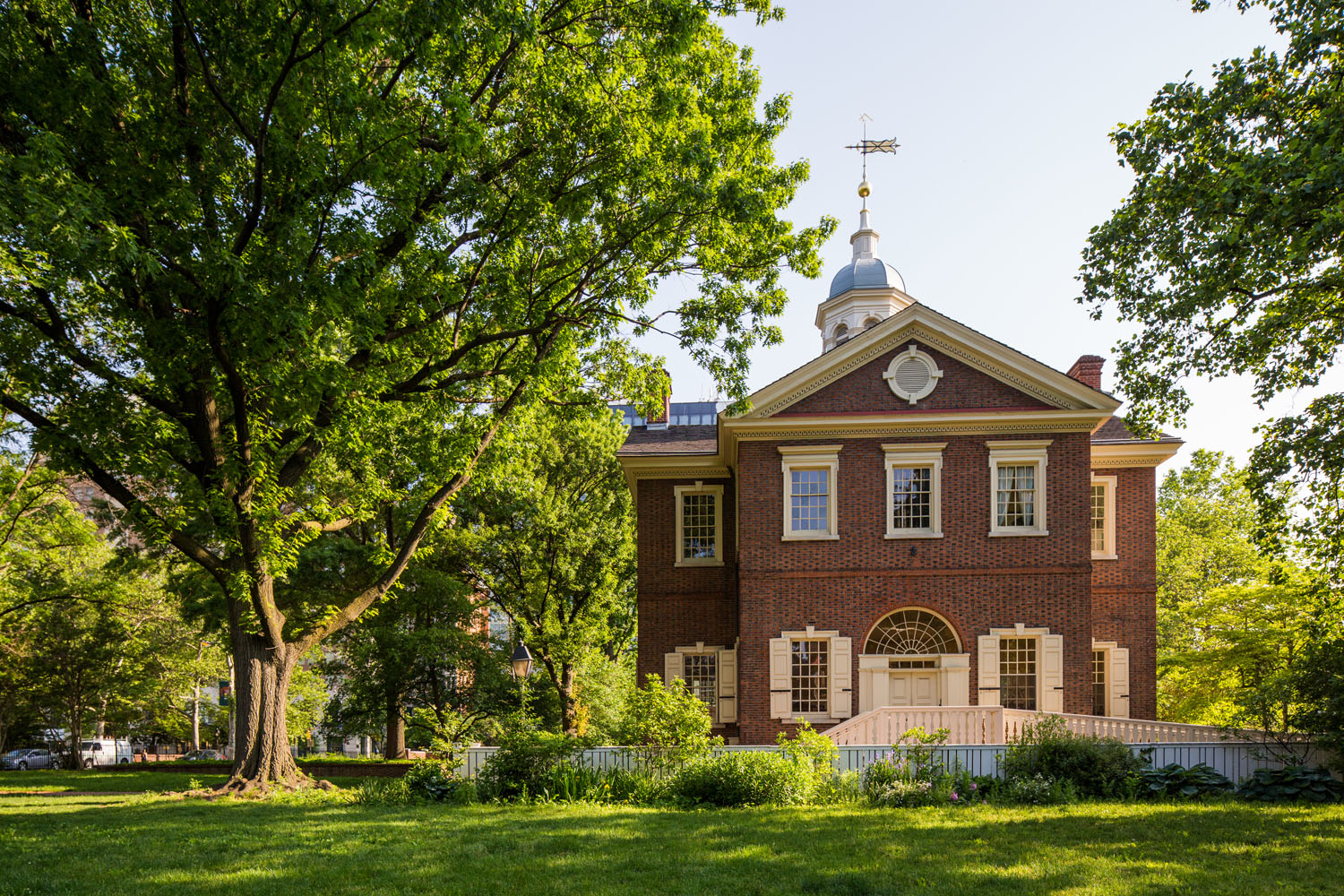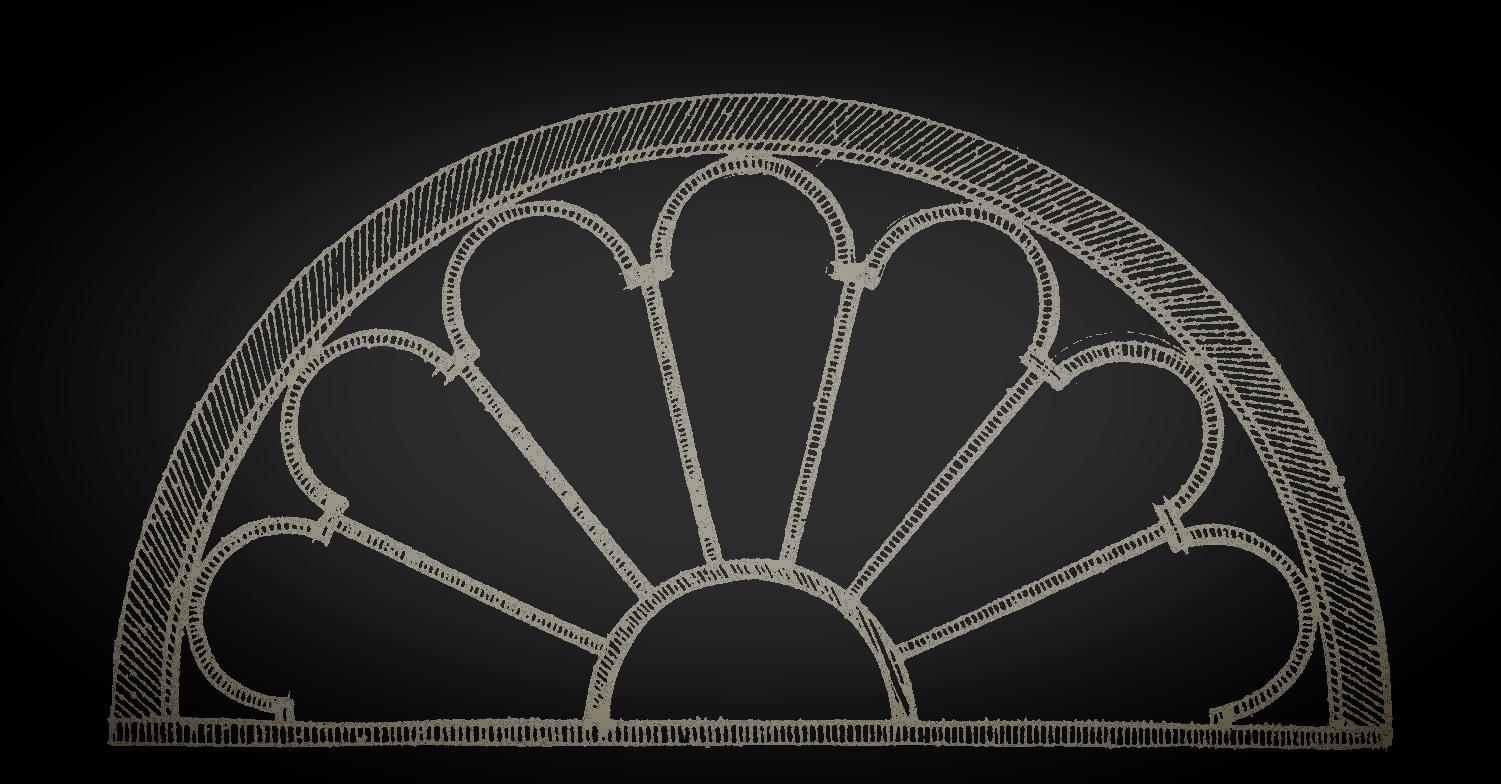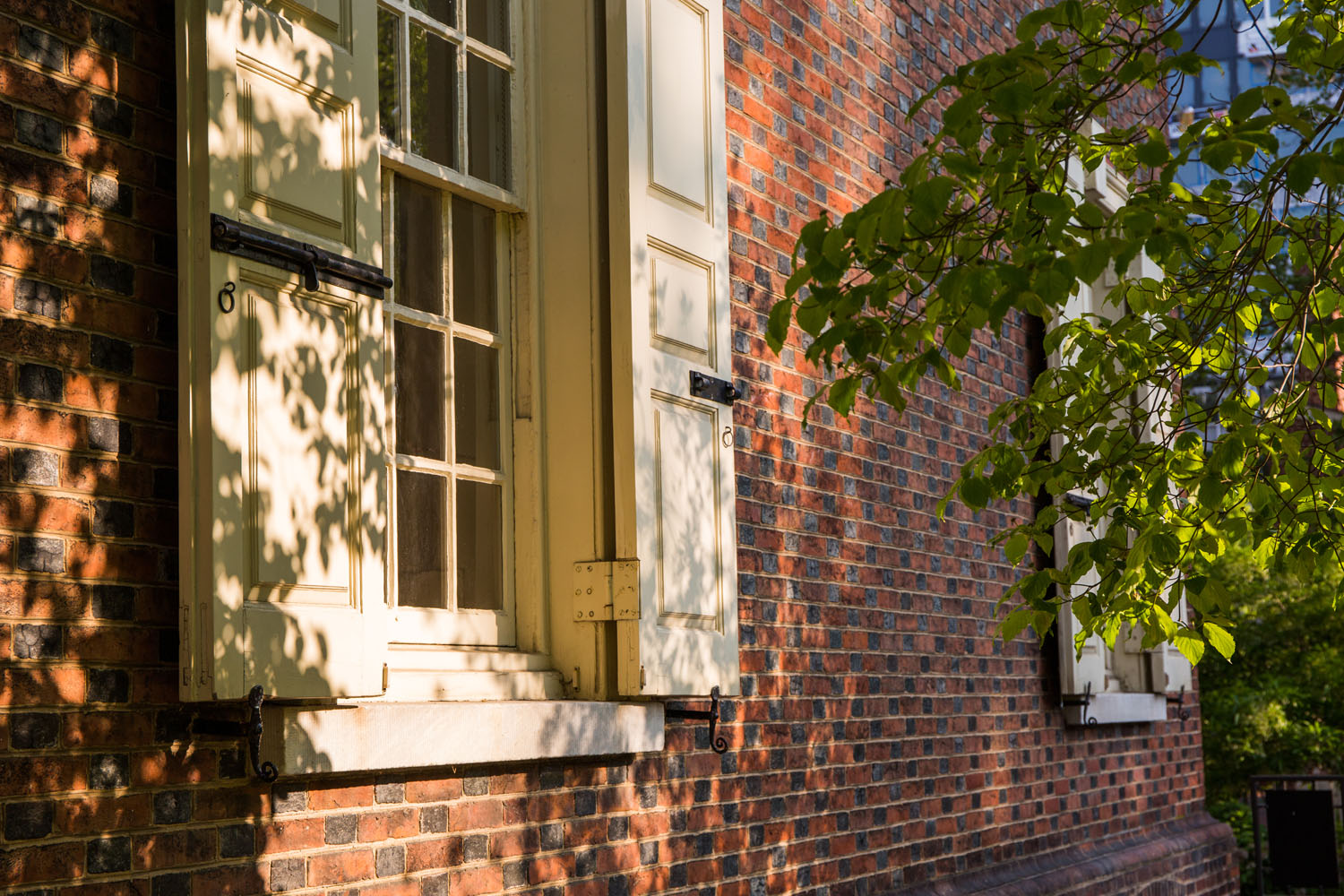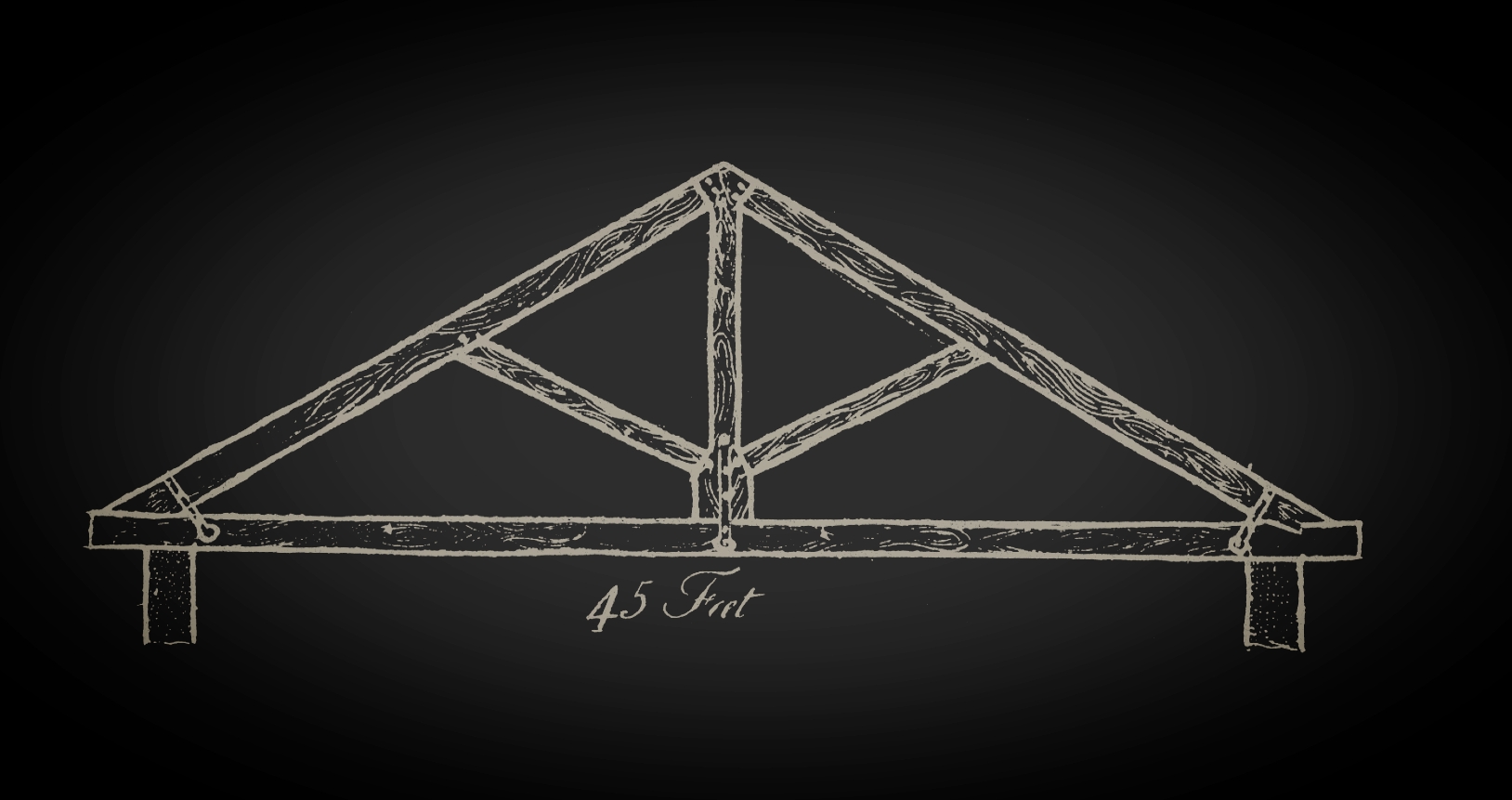Timeline of Carpenters' Hall
Carpenters' Hall has a long history as a meeting place. It has been the home to numerous tenants in the arts, sciences and commerce, and remains the headquarters of the oldest extant craft guild in America. It was the site of the First Continental Congress in 1774 and was occupied briefly by the British during the Revolution. The Hall still has tenants and has been the site of many celebrations. Here is a timeline outlining the many events in the Hall's history.
1724
The Carpenters' Company of the City and County of Philadelphia founded.
Feb. 3, 1768
Lot purchased on Chestnut Street for the building of Carpenters' Hall
Feb. 5, 1770
Building of the Hall commenced based on a design and drawings by Robert Smith, a member of The Carpenters' Company.
Jan. 21, 1771
First occupied by the Company for its annual meeting in the Hall (more of a site inspection as the Hall was still being built). The Company continued to meet in the Hall until the British took possession in 1777; and after they left, the first meeting of the Company in the Hall was Jan. 18, 1779.
Apr. 23, 1773
The Society of Englishmen and Sons of Englishmen held its first meeting in the Hall, on St. George's Day.
1773
First insurance survey by Gunning Bedford (whose portrait hangs in the Hall). Bedford was an insurance surveyor for the Philadelphia Contributionship for the Insurance of Houses from Loss by Fire. He was an early Master (President) of the Carpenters' Company of the City and County of Philadelphia.
Jan. 1, 1774
The Tailors' Company rented the Hall for their meetings at the rate of 10 shillings per night, with use of a closet and firewood.
Sept. 6, 1773
The Library Company of Philadelphia formed Jul. 1, 1731 by Benjamin Franklin and others, occupied the second floor until Dec. 30, 1791. Books were hard to come by in the 1730s as they were expensive. The Library Company was formed as a collection of books that could be borrowed and shared. It was kept first in a librarian's lodgings, then moved to the State House (Independence Hall), then to the newly built Carpenters' Hall. The use of the Library was offered to the First Continental Congress, thus making it the first library of Congress. Today the Library Company's collection is located on Locust Street. MORE
Jun. 20, 1774
Committee of Correspondence of the City and County of Philadelphia met in the Hall to initiate measures for calling a General Congress of the Colonies. The Committee included Company member Robert Smith.
Jul. 15, 1774
Delegates from the nine counties of Pennsylvania met in the Hall and prepared a set of resolutions recommending appointment of delegates by all Colonies to a Continental Congress. They adjourned on Jul. 21, but continued to meet thereafter.
Sept. 5, 1774
The First Continental Congress listed the grievances of the Colonies, and recommended that a Second Congress meet in May 1775 if redress were not given by the King and Parliament.
Oct. 3, 1774
Francis Daymon, Franklin's librarian, opened his French Academy in the Hall's Library Room.
Nov. 17, 1774
The Light Horse of the City of Philadelphia was formed this date in the Hall. Commonly called the First City Troop, its official name now is the First Troop Philadelphia City Cavalry. On Nov. 17, 1774, three members of Philadelphia's Committee of Safety met with twenty-five leading citizens to form a cavalry troop of volunteers. It is the oldest mounted military unit in continuous service in the U.S. Armed Forces, protective service for presidents.
Mar. 16, 1775
Committee on American Manufactory of Linens, Woolens, etc. met in the Hall to consider plans.
Jun. 30, 1775
The Pennsylvania Assembly established the Committee of Safety, which met in the Hall until its dissolution on Mar. 13, 1777.
Jul. 12, 1775
The Military Association for the City and Liberties met in the Hall. Volunteers, or Associators as they were called, served in the Continental Army. On Mar. 17, 1777, the Assembly passed the first draft of the Militia Act.
Oct. 23, 1775
Peyton Randolph, President of the First and Second Continental Congresses, died. The Assembly met in the Hall to attend the funeral services delivered by Reverend Jacob Duché in Christ Church.
Dec. 1775
On three nights Carpenters' Hall was host to secret meetings between Benjamin Franklin, John Jay, Fancis Daymon, and French emissary Julien Achard de Bonvouloir. The meetings eventually led to negotiations for French support of the colonists. The colonies likely would not have been able to win the Revolutionary War without French aid. MORE
Apr. 8, 1776
The Rifle Battalion met in the Hall to elect officers; Timothy Matlack (later a Free Friend) was chosen its Colonel.
Jun. 18, 1776
The Pennsylvania Provincial Conference met in the Hall until Jun. 25, 1776, and passed one resolution calling for a convention to establish a new Pennsylvania Constitution (among others). On Jun. 25, 1776, it delivered a Declaration of Independence to Congress.
1776
First regular custodial service.
1776-1777
The cellar and parts of the First Floor were occupied as a Storehouse and office by the U.S. Barracks Master and the U.S. Commissary General.
1776-1777
Part of the first and second floors of the Hall were used as an Infirmary for disabled American soldiers.
Sept. 26, 1777
British troops occupied Philadelphia and the Hall until Jun. 18, 1778. After the British left the Hall it was used as space for Barracks Master Joseph Fox. Fox served as master (or president) of The Carpenters' Company and as a representative of Philadelphia City and County in the Pennsylvania Assembly, serving as its speaker in 1764. Fox's home was burned during the British occupation of Philadelphia.
Mar. 3, 1779
The Constitutional Society, with its president Charles Willson Peale, held several meetings in the Hall during March and April.
1779
Commissary General Henry Knox occupied the cellar and first floor of the Hall.
1780-1789
The American Philosophical Society rented the first floor West Room, for its scientific apparatus and astronomical instruments. The Society was founded in 1743 by Benjamin Franklin, to encourage scientific activity and discover. It was housed in Philosophical Hall in Independence Square. Franklin served as its president until he died in 1790. The Society's library is today a research center.
1786-1790
The Society for Promoting Agriculture conducted its meetings in the Hall. George Washington was in attendance on July 3, 1787.
Oct. 17, 1790
The Secretary and Receiver of Land Office occupied three rooms on the second floor of the Hall.
Sept. 7, 1791
The Hall was leased to the Bank of North America for two years, and the Bank commenced business in December.
Feb. 22, 1792
George Eddy leased the Hall and by arrangement gave the part lately occupied by the Commissary General, to the National Bank.
Jan. 20, 1794
The first floor was leased to the First Bank of the United States until its own building on Third Street was finished.
1798-1801
The Hall was leased to the Bank of Pennsylvania.
Sept. 2, 1798
America's first bank robbery took place at Carpenters' Hall, then the home of the Bank of Pennsylvania. The Bank was robbed of $162,821.61 during the yellow fever epidemic. A Carpenters' Company member, Isaac Davis (elected in 1794), was expelled from the Company, having been found guilty of the robbery along with the porter of the Bank. MORE
1801-1817
Muhlenberg and Collector of the Port Custom House.
Oct. 1, 1816
The Hall was leased to the Second Bank of the United States until Feb. 9, 1821.
1817
In the 1700s and early 1800s The Carpenters' Company was a trusted organization, setting prices for most building jobs in Philadelphia. They were also a relatively small group, and their company Rule Book was kept privately among the members. In 1817, even former President Thomas Jefferson was refused a copy of the Book.
Feb. 23, 1821
The Philadelphia College of Pharmacy was established at a meeting held in the Hall, and instruction began the next fall in the school on Seventh Street. The College was founded when concern began to grow that medicines and treatments were not scientific or regulated, and discoveries began to be made of cures but there was no formal meeting place to discuss them or teach students entering the field. Carpenters' Hall became this meeting place.
Mar. 12, 1821
Society for Education of Female Children rented the Hall.
Mar. 12, 1821
The Musical Fund Society rented the first floor until Dec. 12, 1824, for the teaching of music and the presentation of its concerts. The Society was started to assist older or ailing musicians and their families (chartered Nov., 8 1820). Concerts began to fund the society in 1821.
Mar. 12, 1821
The Apprentices' Library*, founded in 1820, first opened in the Hall and occupied the second floor until Sep. 12, 1828.
Dec. 26, 1822
School by John Willets rented the Hall.
Nov. 15, 1824
The Franklin Institute was housed on the first floor of the Hall until Apr. 12, 1826. The Institute was first intended for mechanical education. Today it serves mainly as a science museum. At times educational programs were sponsored by the Institute, and it has always provided experts in varying fields to present lectures on developing technology. The Institute was first housed in Carpenters' Hall, then was moved to what is today the Atwater Kent Museum (of the city of Philadelphia), before moving to its present home at 20th Street on the Ben Franklin Parkway.
Jan. 1, 1827- Mar. 1, 1828
The Hicksite Society of Friends occupied the second floor of the Hall until Mar. 1, 1828, when their Meetinghouse on Cherry Street near Fifth was completed.
Aug. 4, 1828
During its 28 years in the Hall, the C.J. Wolbert Auction Room occupied part of the first floor, later renting the cellar, and still later adding part of the second floor.
1857
For almost 30 years, Carpenters' Hall had been rented by C.J. Wolbert and Company's Auction House. It was around this time that historians such as Benson Lossing began to reproach the Company for allowing such a historic landmark to be desecrated by tenants with no sense of the building's true significance. In 1857, The Carpenters' Company made repairs and restorations to the Hall and opened it freely to the public, the first privately owned American building to be opened as a historic monument.
Sept. 5, 1874
Celebration at the Hall of the 100th anniversary of the First Continental Congress and the 150th anniversary of The Carpenters' Company of the City and County of Philadelphia. A Committee of Arrangements was assembled with John Welsh, Esq. (filling in for the PA Governor) and Vice President Henry Wilson. Portraits decorated the Hall, a speech was made by famed orator Henry Armitt Brown and a hymn was led by DeWitt Clinton Moore. MORE
Jul. 21, 1924
President Calvin Coolidge elected honorable member of The Carpenters' Company of the City and County of Philadelphia.
Sept. 25, 1924
A celebration was held at the Hall for the 150th anniversary of the First Continental Congress and the 200th anniversary of The Carpenters' Company of the City and County of Philadelphia. The festivities included an invited guest reception with speakers, a banquet at the Bellevue-Stratford, exercises at the Academy of Music, a parade on the Parkway, and a reenactment of the First Continental Congress at Carpenters' Hall. This was followed by speeches by two former Pennsylvania Governors, and the certificate of honorary membership was presented to Senator George Wharton Pepper on behalf of President Coolidge. MORE
April 15, 1970
Carpenters’ Hall is declared a National Historic Landmark.
Sept. 9, 1974
The Carpenters' Hall Station of U.S. Postal Service was established at the Hall. Many commemorative covers, beginning with the first day cover of Jul. 4, 1974 of the Continental Congress stamp, and later, the B. Free Franklin cancellation were issued.
Oct. 13, 1975
The U.S. Navy celebrated the bicentennial of its founding by the Congress — Navy Day.
Jul. 6, 1976
Queen Elizabeth II of England and Prince Philip visited the Hall during the bicentennial celebration.
Sept. 16 1986
Chief Justice Burger and emissaries from France visited the Hall.
Mar. 12, 1994
King Carl XVI Gustaf and Queen Silvia of Sweden visited the Hall.
Jul. 3, 1994
President Vaclav Havel of the Czech Republic visited the Hall.
Oct. 26, 1996
The Association of Inspectors General chartered at the Hall.
May 7, 1997
Pennsylvania Governor Tom Ridge visited the Hall.
Jul. 4, 1999
South Korea President Kim Jae Dung visited this Hall after receiving the Philadelphia Liberty Medal.
Oct. 26, 1999
225th anniversary celebration of the First Continental Congress held in Carpenters’ Hall.
Jun. 9, 2000
Governor of Texas, George W. Bush, visited the Hall during the events of the Republican National Committee.
Feb. 6, 2003
225th Commemoration of the French American Alliance, a historic relationship so crucial in helping to win the American Revolution, was celebrated in the Hall.
Jul. 1, 2005
Visit to the Hall by the descendants of Julien Alexandre Achard de Bonvouloir, the French Emissary who secretly met with Benjamin Franklin in Carpenters’ Hall in 1775 to negotiate critically important French aid to the Colonist’s cause.
May 9, 2009
London’s Worshipful Company of Carpenters visit the Hall of The Carpenters’ Company of the City and County of Philadelphia in their decennial visit.
May 18, 2012
CBS Newsman Morley Safer interviews American author David McCullough for a 60 Minutes Profile, a “Journey through History” in and around the Hall.
* Footnote: Specified tenants and events may have been in nearby New Hall (built 1790), since records call both Carpenters' Hall and New Hall simply "the Hall."








